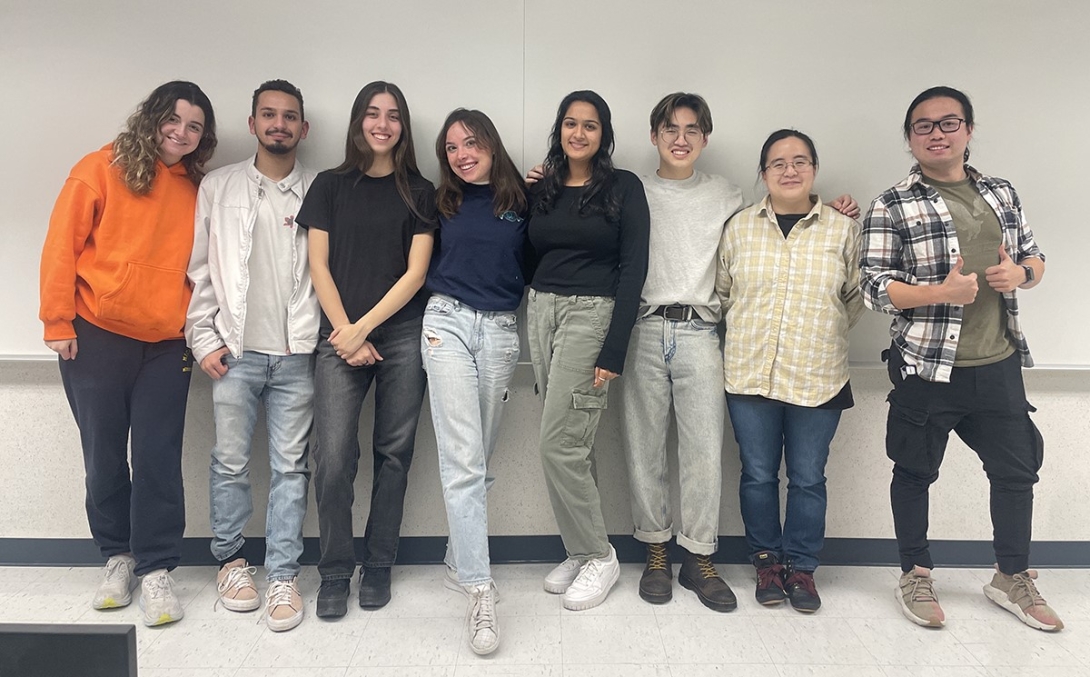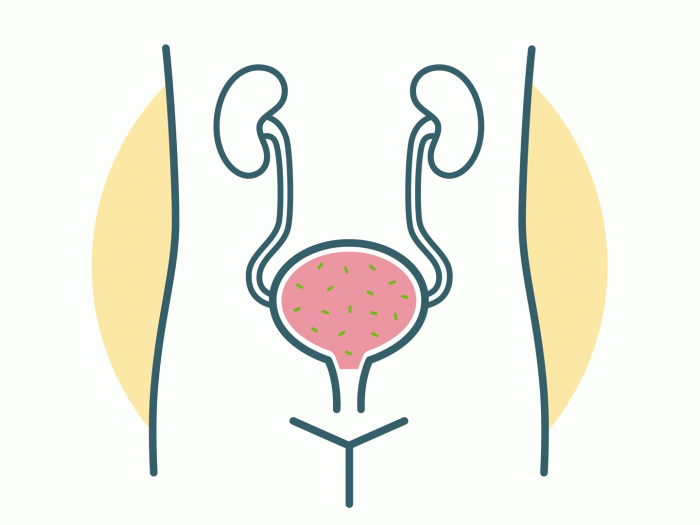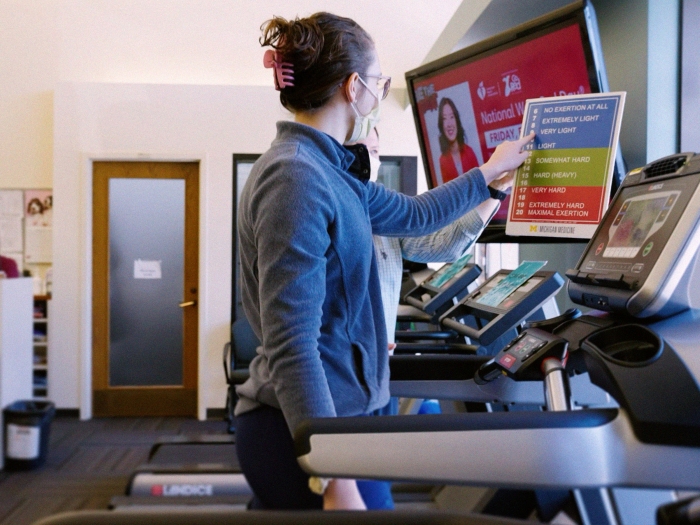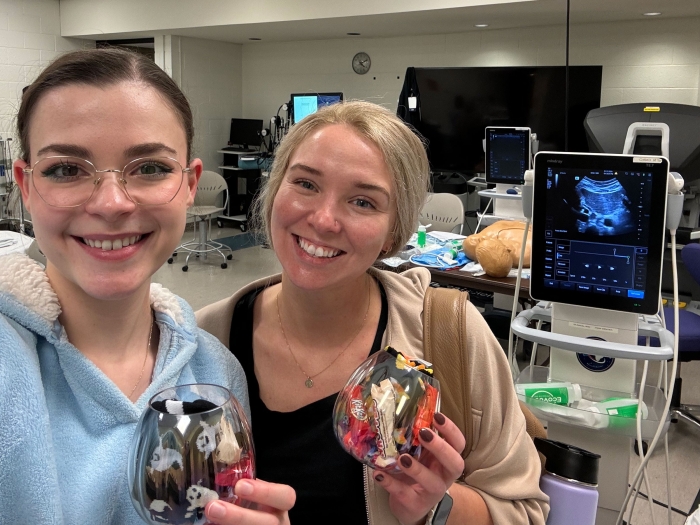The student organization Program Advancing Coding Comfort for Aspiring biomedical Researchers (PACCAR) aims at providing biomedical junior researchers and trainees with basic computational exposure, training and support. This Fall, it offers in-person meetings where students present to students basic computational tools with hands-on applications. Everyone is welcome and membership is free of charge. PACCAR has also a Slack channel to share meeting material and resources to engage discussions. Launched in September 2023, the organization already has over 90 members and an attendance of about 30 people at its bi-weekly in-person meetings, demonstrating the need for more support in the application of data science and computational skills to biomedical initiatives.
The Program originated in July 2023 from a student experience. Cara Teixeira, a senior BS student in Neuroscience and a student in the Department of Computational Medicine and Bioinformatics (DCMB) Accelerated Master’s Degree Program, did a summer fellowship with the Spencer-Segal Lab that focuses on neuro-endocrinology and responses to stress. Her project involved searching for a protein marker of neural activity in response to activation of a neural projection of interest, in a large number of images from a large number of animals.
Teixeira clearly needed an automated workflow to process so many images, but she had had very little training in data science and software development. Using ImageJ software, Vivek Kumar, a senior Research Lab Specialist in the Michigan Neuroscience Institute, helped her adapt the code to her needs. Once the software was developed, she was able to process all her data. When she presented an overview of her software to students and faculty in the Michigan Neuroscience Institute, there was a lot of enthusiasm about this tool and its many possible applications.
With this experience, Teixeira saw an opportunity to address a gap in computational training among biomedical researchers and decided to start a student organization. Involving her friend Taleah Nelson, now PACCAR Vice President, and with the guidance and mentorship of Dr. Mitrea, DCMB faculty member, they recruited an executive board, engaging fellow bioinformatics students who could show and demonstrate coding. These “teachers” also benefit from this experience by developing their own teaching skills and deepening their knowledge of the content to be presented to others. “We all learn from each other,” said Teixeira. They are also very grateful for Dr. Mitrea who generously shared her teaching insights and offered mentoring.
“We all learn from each other.”
Cara Teixeira, PACCAR President and Founder
Jan Rosa, an MS student in Computational Medicine and Bioinformatics, is one of PACCAR’s founding members, and is very enthusiastic about being part of this project. “I was amazed that no one had thought of this before,” he said. “I knew it would become something big!” As a former BS student in Biomedical Engineering, he feels that he had not been taught much about programming and with the rise of AI, he is concerned with having competitive computational skills. For him, PACCAR is a great outreach club that get scientists from various backgrounds interested in learning computational tools that will eventually set them apart on the job market.

PACCAR Executive Board, left to right: Brooke Beccari, Jan Rosa, Taleah Nelson, Cara Teixeira, Aanya Mohan, Patrick Halim, Hojae Lee, Serenata Su (not on Executive Board)
PACCAR targets pre-med students but also the data science trainees who will ultimately deliver the curriculum. PACCAR is organized in three committees: a programming education committee to design a curriculum and teach the basics of coding; a project planning committee that focuses on the application of the computational tools; and a biotech education committee that explains the biological side and how technology can help solve medical problems. Additionally, Teixeira is an entrepreneur at heart, so marketing was a high priority for her when starting PACCAR. “The marketing budget for the Barbie movie was higher than the budget to make the movie itself,” she said. “This shows the importance of marketing for success!”
Dr. Mitrea considers that coding requires a lot of hands-on time, and DCMB classes meet only twice a week. “This is just not enough time to really know how to do it. With PACCAR, students get some additional time and support they need,” she said. This is echoed by Teixeira who announced that the group will meet weekly in Winter 2024.
DCMB supports student initiatives and organizations and is in the process of becoming PACCAR’s first sponsor.
PACCAR Executive Committee Members
President: Cara Teixeira, Computational Medicine & Bioinformatics and Neuroscience
Vice President: Taleah Nelson, Microbiology and Computer Science
Secretary / Director of Correspondence: Brooke Beccari, Public Health
Treasurer / Director of Finances: Aanya Mohan, Computational Medicine & Bioinformatics and Informatics
Project Planning Chair: Hojae Lee, Computer Engineering
Biotech Education Chair: Jan Rosa, Computational Medicine & Bioinformatics
Programming Education Chair: Patrick Halim, Computer Science
Project Planning Committee: Adrienne Giannone, Caroline Wang, Dominic Bonasse, Joshua Chae, Mahnoor Gondal, Evangelia Kahremanis
Biotech Education Committee: Mayowa Akinwale, Sathvik Rajagopalan, Mira Bhandari, Serenata Su, Tayler Hansen-Bates
Programming Education Committee: Joel Son, Paula Wu, Rushabh Shah, Saif Alesawy, Emma Cherrin
Head of Marketing: Sathvik Rajagopalan
Faculty Advisor: Cristina Mitrea, Ph.D.
For more information, contact Brooke Beccari ([email protected](link sends e-mail)




